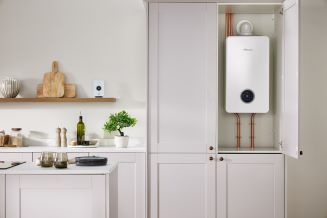
Changes to SAP 10 are “too flattering” for electricity
Published: 14-11-2018
- Some of the proposed changes to the Standard Assessment Procedure (SAP) 10 by BRE and BEIS are ultimately flawed.
- SAP 10 changes do not reflect the seasonality of renewables which experience peaks in the summer and troughs in the winter.
- Developers who build en masse may look to cut their build costs by installing cheaper immersion heaters and electric panel heaters.
- The switch to electric heating technologies places consumers at risk of paying higher energy bills.
Some of the proposed changes to SAP 10 by the Building Research Establishment (BRE) and the Department for Business, Energy & Industrial Strategy (BEIS) are questionable at best and ultimately flawed, according to Martyn Bridges, our Director of Technical Communication and Product Management.
Martyn says that the proposed carbon intensity changes to electricity in SAP 10 are “far too flattering” and will place consumers at risk of paying more for their energy bills.
Despite the initial proposal for electricity’s carbon factor being 0.398 kgCO2/kWh, under the proposed changes, electricity’s annual average CO2 emission factor will be reduced from 0.519 kgCO2/kWh to 0.233 kgCO2/kWh (a 55% reduction) and will place electricity just behind gas which has a CO2 emission factor of 0.210 kgCO2/kWh.
Martyn comments: “Prior to SAP 10, it was assumed that 2.4 times the amount of carbon was produced when using electricity compared to gas. The changes in SAP have been made to reflect the growing use of renewables in the energy grid. However, these changes do not reflect the seasonality of renewables such as solar which inevitably experiences usage peaks in the summer and troughs in the winter. In contrast to peak heating system usage, SAP 10 makes the flawed mistake of assuming that low carbon electrical efficiency is maintained at this low level throughout the year.”
The proposed reduction could pose a serious challenge to the UK’s housing stock. Housing developers who build en masse can drastically cut their costs by installing electrical panel heaters and immersion heating cylinders. While being cheaper for the developer, the homeowner could face paying higher energy costs for these technologies.
Martyn explains: “We recently ran SAP rating tests on three new, but different, house designs. We found that the running costs of heat pump electrical heating and hot water provision was generally around 50% more than with a gas-fired boiler system. In an existing home where the heating system or insulation has not been optimised for a heat pump, this cost will rise further.”
Martyn concludes: “Gas continues to dominate as the UK’s primary fuel for domestic heating – accounting for 66% of the fuel used to warm our homes. The heating industry is committed to driving down carbon emissions from domestic heating, but glamorising electricity as an energy efficient alternative to gas is deeply flawed.
“When considering the changes made under SAP 10, we must reflect on the fact that consumers will pay considerably more for their heating and hot water – heat pumps, electrical panel heaters and storage heaters will all cost homeowners more than simply installing a combi.”
Sign up to our mailing list to keep up to date with the latest news, products and services.
More News

How to ensure boilers condense - what installers need to know
Martyn Bridges, our Director of External Affairs, discusses best practices for installers to follow when maximising boiler efficiency.

Worcester Bosch proud to support pioneering decarbonisation hub in Penygroes
We are delighted to announce we are a part of a ground-breaking decarbonisation hub, titled Tŷ Gwyrddfai, in north west Wales – the first of its kind in the UK – which launched last week.

PowerUp with 50% Off product training courses
We’ve discounted a range of training courses to help you Power Up this heating season.




